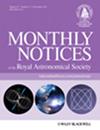扩展绿色物体G19.01–0.03:ii的ALMA观测。一颗具有典型化学丰度的大质量原恒星,周围有四个低质量的星前核心候选者
IF 4.7
3区 物理与天体物理
Q1 ASTRONOMY & ASTROPHYSICS
引用次数: 0
摘要
我们使用亚弧秒角分辨率的阿塔卡马大型毫米/亚毫米阵列(ALMA)1.05毫米和卡尔·G·扬斯基超大阵列(VLA)1.21厘米的数据研究了扩展绿色物体(EGO)G19.01−0.03的物理和化学性质。G19.01−0.03 MM1,与中心大质量年轻恒星天体(MYSO)相关的毫米源,在之前的亚毫米阵列观测中似乎是孤立的,并且可能是化学年轻的。在我们的~0.4〃分辨率ALMA数据中,MM1有四个在0.12pc内的低质量毫米伴星,它们都缺乏脉泽或外流发射,这表明它们可能是星前核心。MM1具有丰富的ALMA光谱,充满了复杂的有机分子,在化学上并不年轻,但具有文献中典型的高质量热芯的分子丰度。基于MM1 LTE合成甲醇光谱的逐像素贝叶斯分析,在MM1的1.05mm连续峰处,N(CH3OH)=(2.22±0.01)×1018cm−2和$T_。有趣的是,CH3OH-Tex=165.5±0.6 K的峰值与MM1的毫米连续峰偏移了0.22〃~880 au,CH3OH-Tex升高的区域与自由VLA 5.01 cm连续相重合,为MM1中可能存在未解决的高质量二元体提供了初步证据。在我们的VLA 1.21 cm数据中,我们报告了第一次探测到G19.01−0.03的NH3(3,3)脉泽,以及候选的25 GHz CH3OH 5(2,3)−5(1,4)脉泽发射;两者在空间和动力学上都与MM1外流中的44GHz I类CH3OH脉泽一致。我们还报道了ALMA对该外流的候选278.3GHz I类CH3OH脉泽发射的检测,加强了这三种脉泽类型与MYSO外流的联系。本文章由计算机程序翻译,如有差异,请以英文原文为准。
ALMA observations of the Extended Green Object G19.01–0.03: ii. A massive protostar with typical chemical abundances surrounded by four low-mass prestellar core candidates
We present a study of the physical and chemical properties of the Extended Green Object (EGO) G19.01−0.03 using sub-arcsecond angular resolution Atacama Large Millimeter/submillimeter Array (ALMA) 1.05 mm and Karl G. Jansky Very Large Array (VLA) 1.21 cm data. G19.01−0.03 MM1, the millimetre source associated with the central massive young stellar object (MYSO), appeared isolated and potentially chemically young in previous Submillimeter Array observations. In our ∼0.4″-resolution ALMA data, MM1 has four low-mass millimetre companions within 0.12 pc, all lacking maser or outflow emission, indicating they may be prestellar cores. With a rich ALMA spectrum full of complex organic molecules, MM1 does not appear chemically young, but has molecular abundances typical of high-mass hot cores in the literature. At the 1.05 mm continuum peak of MM1, N(CH3OH) = (2.22 ± 0.01) × 1018 cm−2 and $T_{\mathrm{ex}} = 162.7\substack{+0.3 \\-0.5}$ K based on pixel-by-pixel Bayesian analysis of LTE synthetic methanol spectra across MM1. Intriguingly, the peak CH3OH Tex = 165.5 ± 0.6 K is offset from MM1’s millimetre continuum peak by 0.22″ ∼ 880 au, and a region of elevated CH3OH Tex coincides with free-free VLA 5.01 cm continuum, adding to the tentative evidence for a possible unresolved high-mass binary in MM1. In our VLA 1.21 cm data, we report the first NH3(3,3) maser detections towards G19.01−0.03, along with candidate 25 GHz CH3OH 5(2, 3) − 5(1, 4) maser emission; both are spatially and kinematically coincident with 44 GHz Class I CH3OH masers in the MM1 outflow. We also report the ALMA detection of candidate 278.3 GHz Class I CH3OH maser emission towards this outflow, strengthening the connection of these three maser types to MYSO outflows.
求助全文
通过发布文献求助,成功后即可免费获取论文全文。
去求助
来源期刊

Monthly Notices of the Royal Astronomical Society
ASTRONOMY & ASTROPHYSICS-
CiteScore
9.10
自引率
37.50%
发文量
3198
审稿时长
3 months
期刊介绍:
Monthly Notices of the Royal Astronomical Society is one of the world''s leading primary research journals in astronomy and astrophysics, as well as one of the longest established. It publishes the results of original research in positional and dynamical astronomy, astrophysics, radio astronomy, cosmology, space research and the design of astronomical instruments.
 求助内容:
求助内容: 应助结果提醒方式:
应助结果提醒方式:


